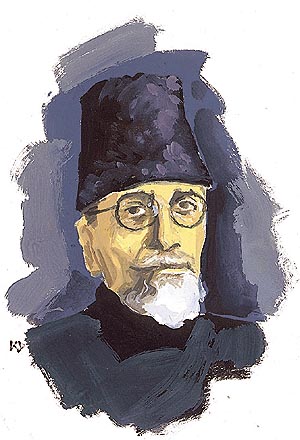LONG before the partition of India, Maulana Azad had warned that "partition would be a bitter pill which would keep the two countries at loggerheads, and the condition of the minorities would be miserable". He added, "It would be a sin to partition India". He did his best to persuade Jinnah to give up the demand for Pakistan, but the latter retorted: "You are a show-boy of the Congress. Give it up." But Azad was not the kind to give up, and he did not give up the cause of Hindu-Sikh-Muslim unity, even after the creation of Pakistan.
 A fighter all his life, he openly criticised Sir Syed Ahmed Khan when he urged the Muslims of India to boycott the nationalist movement. He came out against the Simon Commission, and he toured Punjab and exhorted his countrymen to boycott it. When the Nationalist Muslim Party was formed in 1929, to function within the Indian National Congress, he was elected its president. After the arrest of Gandhi and Motilal Nehru, he became the acting president of the Congress. In Delhi he organised the All-India Muslim Conference, denounced the partition plan, and also decried the claim of the Muslim League as representative of the Muslims of India.
A fighter all his life, he openly criticised Sir Syed Ahmed Khan when he urged the Muslims of India to boycott the nationalist movement. He came out against the Simon Commission, and he toured Punjab and exhorted his countrymen to boycott it. When the Nationalist Muslim Party was formed in 1929, to function within the Indian National Congress, he was elected its president. After the arrest of Gandhi and Motilal Nehru, he became the acting president of the Congress. In Delhi he organised the All-India Muslim Conference, denounced the partition plan, and also decried the claim of the Muslim League as representative of the Muslims of India.
On December 10, 1921, he was arrested for delivering objectionable speeches, and fanning the flames of the non-cooperation movement. Defending himself, he said: "I believe that liberty is the birthright of every nation and individual. No man nor any man-made bureaucracy possess the right of enslaving human beings. However, attractive we may coin the names for slavery and servitude, still slavery will remain what it is. It is against the will and canons of God. Therefore, I refuse to admit the present government as a valid authority and, consequently, think it to be my national, religious and human duty to relieve my country and nation of this servitude. . . ."
But that was not all. Like most of the other leaders, Azad was also a great writer and thinker. He did commendable work as editor of Nairang-i-Alam. Later he started publishing his own newspaper, Lisan-us-Sidq. His Tarjuman-ul-Quran is considered to be a masterpiece.
When Nehru learnt about Azad's death, he said: "We mourn today the passing of a great man, a man of luminous intelligence and a mighty intellect with an amazing capacity to pierce through any problem to its core. I use the world 'luminous', I think perhaps that is the best word I can use about his mind - a luminous mind. When we miss and when we part with such a companion, friend, colleague, comrade, leader, teacher, call him what you will — there is inevitably a tremendous void created in our life and activities."
http://www.tribuneindia.com/2000/20000130/spectrum/main2.htm
No comments:
Post a Comment